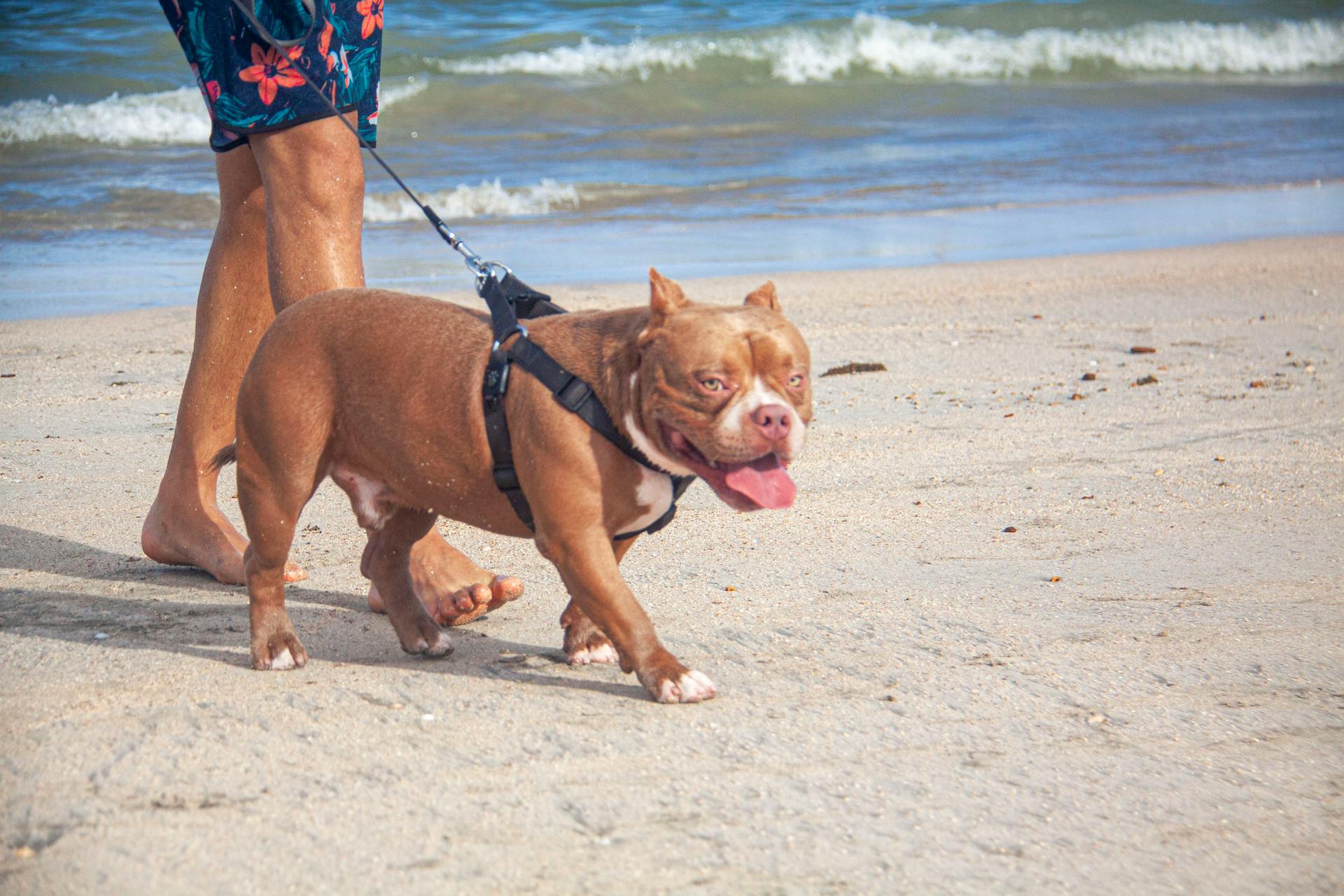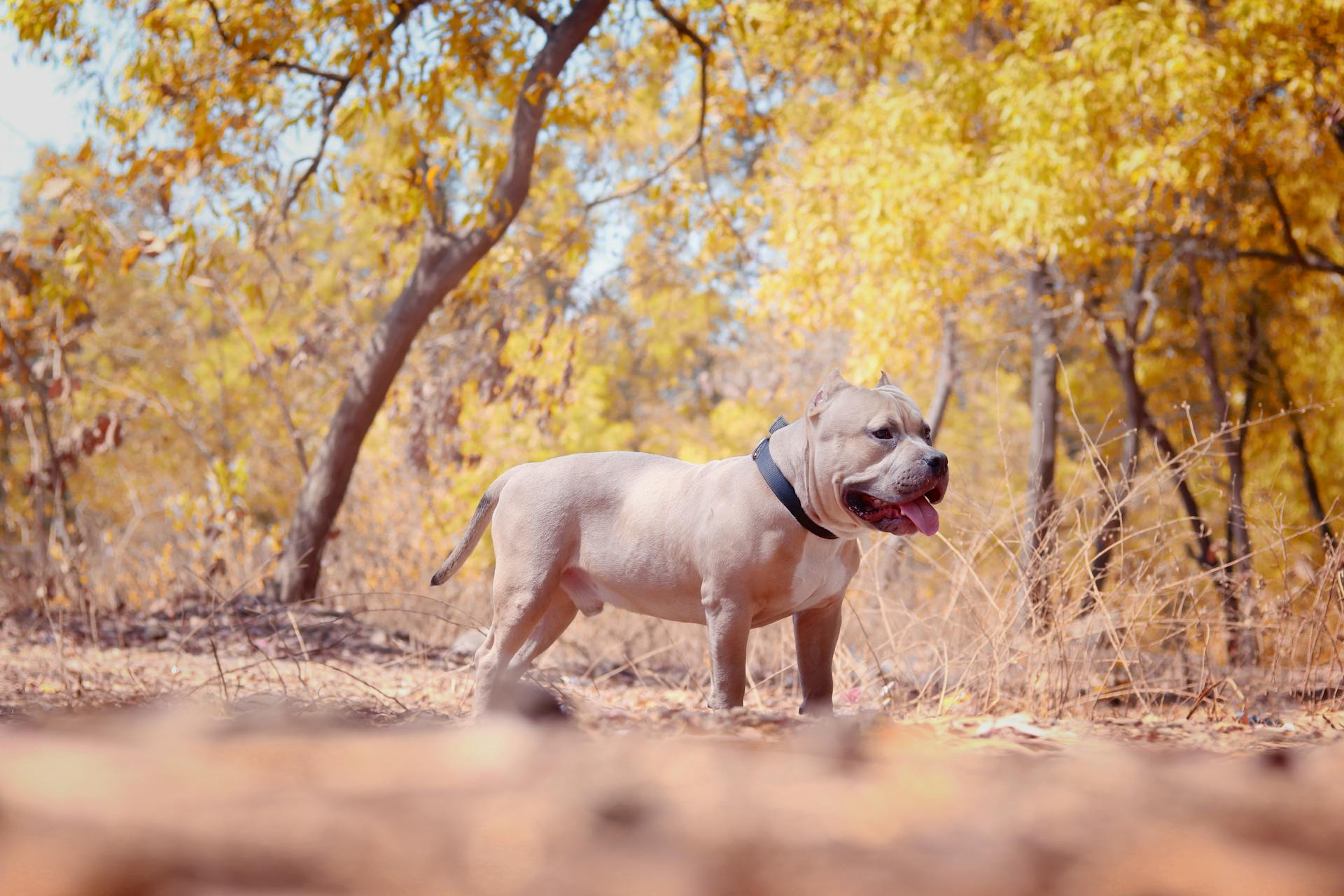
In the United States, service dogs can be trained to assist individuals with a wide range of physical, emotional, and mental disabilities. These dogs are highly specialized and trained to perform specific tasks to aid their handlers.
Some service dogs are trained to assist individuals who are deaf or hard of hearing, while others are trained to provide support for those with mobility issues. Service dogs can also be trained to detect changes in their handler's blood sugar levels or to respond to seizures.
These incredible animals are not just limited to physical disabilities, they can also be trained to support individuals with post-traumatic stress disorder (PTSD), autism, and other conditions. Their presence can be a source of comfort and stability for their handlers.
Take a look at this: Ada Laws on Service Dogs
What Is a Service Dog
A service dog is a highly trained animal that assists individuals with disabilities, illnesses, or injuries. They're not just pets, but working animals that provide vital support.
Service dogs can be trained to detect and respond to various health conditions, such as seizures, low blood sugar, or allergies. Their keen sense of smell and ability to recognize patterns make them invaluable companions.
These dogs can also be trained to perform specific tasks, like opening doors, picking up items, or providing physical support, to help their handlers navigate daily life.
What Qualifies a Service Dog
A service dog is trained to assist a person with a disability, and their qualifications are crucial to their role.
Good qualities for a service dog include an eagerness to please, a tendency to follow you around, a relaxed but friendly demeanor, and alert but not reactive behavior.
They welcome touch from anyone, including children and strangers.
Service dogs must be adaptable to many different situations and stay calm in new environments.
They have to learn quickly and retain new information.
Who We Serve
We serve individuals who have bravely served our nation, including veterans and first responders. They are often affected by PTS and TBI, conditions that can lead to debilitating symptoms and even suicide.
More than 6,000 veterans tragically commit suicide each year, and thousands more are diagnosed with PTS and TBI. Approximately 184 veterans receive a PTS diagnosis every day.
We also serve female veterans and first responders, who are disproportionately affected by PTS and MST. One in three female veterans is estimated to experience MST, a form of PTS.
Over 80 percent of first responders experience traumatic events on the job, leading to high rates of PTS among this group. Roughly one in three first responders develops PTS as a result.
Service Dog Breeds
Labrador Retrievers and Golden Retrievers are the most common breeds for guide dogs and mobility assistance dogs. These breeds are often used because of their predictability and trainability.
Service dogs can range from very small to very large in size, and the right size is crucial for the dog to comfortably execute the tasks needed. A Papillon, for example, wouldn't be an appropriate choice to pull a wheelchair.
You might like: Australian Shepherd Herding Dog Breeds
Canine Companions maintains a breeding program for Labrador Retrievers and Golden Retrievers, selecting only the "best of the best" based on temperament, trainability, health, and physical attributes. This program yields improved results.
Larger breeds like Great Danes, Saint Bernards, and Bernese Mountain Dogs have the height and strength necessary to provide mobility assistance. They are a good fit for tasks that require physical strength.
NEADS World Class Service Dogs also maintains a breeding program and obtains puppies from reputable breeders, selecting dogs based on temperament, health, and behavioral history.
Consider reading: American Pitbull Terrier Temperament
Training a Service Dog
Training a Service Dog is a long and arduous process that requires patience, dedication, and the right guidance. Dogs must perform their tasks on command or demonstrate they can alert their owner to dangers such as low blood sugar or an oncoming seizure.
Most service dogs require 18-24 months of training by a professional, but if you're training your own dog, it will take about two years, give or take, to become fully trained to assist a person with disabilities.
To start, you should seek the help of a professional dog trainer, even if you plan to train your own dog as a service dog. Foundation skills such as potty training on command, focus on the handler and ignoring distractions, and AKC Canine Good Citizen objectives are essential for a service dog career.
Here are some key foundation skills to focus on:
- Potty on command
- Focus on the handler and ignore distractions
- All AKC Canine Good Citizen objectives
- Public Access skills
Public Access skills are crucial for service dogs and their handlers, and include controlled loading into and unloading out of a vehicle, controlled approach to a building, and controlled entry and exit through a doorway.
Service dogs and their handlers have a responsibility to present a relaxed, positive image in public, and must meet certain standards for behavior in the Public Access Test.
You might like: Public Access Test for Service Dogs
Service Dog Certification
Service Dog Certification is not required by law in the United States. You don't need to register a service dog, but having documentation can be helpful in explaining the role your dog plays.
A physician or mental health professional prescribes a certified service dog who is arduously trained to perform necessary tasks and duties for an individual with physical, psychiatric or emotional disabilities. This prescription letter should be carried with you when your service dog is in public.
Some organizations offer registration or certification, but these have no standards or tests, making them essentially scams. In reality, anyone can register a service dog and claim it's certified.
Check this out: Is There a Certification for Service Dogs
What Is a Vest
A vest is a type of harness worn by service dogs to identify them as working animals.
Service dogs wear vests to signify their status as trained animals performing a specific task.
You might like: How to Make Dogs Service Animals
Certification
Certification is a topic that can be a bit confusing, especially for those who are new to service dogs. You don't actually need to register a service dog in the United States.
In fact, registration or certification of a service dog is not required by law. However, having a letter from a physician or mental health professional can be helpful when answering questions about your service dog's role.
Readers also liked: Certification for Service Dogs in Florida
The key is to understand that certification is not the same as registration. Registration is often a scam, and it's not a standard or test that is recognized by any legitimate organizations. Anyone can register a service dog, which is why it's not considered a reliable way to verify a service dog's status.
Service dogs should always wear a service dog vest and ID when in public, and it's a good idea to keep a copy of your letter from your physician with you at all times. This can help answer questions and provide documentation when needed.
Explore further: How Do Service Dogs Know When to Alert
Service Dog Travel
Service dogs can fly on American Airlines, and the airline's policy matches the U.S. Department of Transportation's definition of a service animal.
You can bring up to two service dogs with you when traveling for free, regardless of your ticket type. This includes basic economy and first class.
To add a service dog to your reservation, you can do so while booking your ticket or after booking by using your confirmation code and last name.
You'll need to complete certain paperwork and provide your service animal ID to add a service dog to your reservation.
Once you've completed the paperwork, you'll be issued an ID number that can be reused for future trips with American Airlines.
If you're traveling with a service dog, you can request an accessible seat by calling the airline's reservation desk.
Accessible seats are often bulkhead seats, which provide more room for your dog to spread out.
Many airports have service dog relief areas located behind the security screening area, so you won't have to exit the terminal if you're on a connection.
Be sure to check the airport maps before your trip to find the service dog relief areas, especially after the flight when your dog may need to use the restroom.
Consider reading: Reservation Dog
Service Dog Registration and Membership
Service Dog Registration and Membership is a crucial step for American Service Dogs. Registration is not mandatory, but it can provide benefits and recognition.
The United States Service Dog Registry is one such organization that offers registration and membership. Registration with them can provide a Service Dog ID card and access to a community of Service Dog handlers.
Registration with the United States Service Dog Registry typically costs between $70 and $100. This fee is usually a one-time payment and includes a registration certificate, ID card, and access to their database.
For your interest: Is There a Registry for Service Dogs
Where to Find
If you're looking for a service dog, you can find professional service dog training organizations and individuals who train service dogs throughout the U.S.
Professional service dog trainers have high standards for their dogs, and the drop-out rates for service dog candidates can run as high as 50% to 70%. This means there are often long lists of available homes for dogs that don’t make the cut.
Both non-profit and for-profit organizations train service dogs, and the cost of training a service dog can exceed $25,000. This includes training for the person with a disability who receives the dog and periodic follow-up training for the dog to ensure working reliability.
Some organizations provide service dogs to disabled individuals at no cost or may offer financial aid for people who need, but cannot afford, a service dog.
Discover more: Volunteer to Train Service Dogs
New Member Submission
If you know of an assistance dog organization in your community that's not a member of ADI, you can help them get involved by submitting their name and contact information.
The ADI Board of Directors is actively seeking this kind of help from its members.
To submit the name and possible contact information of a non-member organization, you'll need to complete the form provided by ADI.
Suggestion: Information about Service Dogs
The Fake Epidemic
Some people obtain fake service dog credentials just because they want their dog with them at all times. This is a federal crime.
This practice harms the truly disabled, confuses the public, and affects the reputation of legitimate service dog users.
In 2016, over 150 laws related to this matter were introduced by state and local governments. The American Kennel Club issued a policy position statement called “Misuse of Service Dogs.”
The Association of Service Dog Providers for Military Veterans created “CGC Plus,” a minimum standard for training and behavior for the service dogs their members provide to veterans. This standard mandates that dogs pass several tests and demonstrate proficiency in performing specific services.
The American Kennel Club works with the American Service Dog Access Coalition, a charitable not-for-profit organization, to improve access for legitimate service dog teams and incentivize high-quality behavioral standards for all service dogs.
A fresh viewpoint: American Kennel Club
Frequently Asked Questions
How much does a USA service dog cost?
The average cost of a service dog in the USA is $15,000 to $50,000, depending on its specific tasks and responsibilities. Learn more about the costs and benefits of service dogs here.
Do service dogs fly free on American?
Yes, fully-trained service dogs can fly in the cabin at no charge, but they must meet specific requirements.
How can my dog become a service dog in the US?
To become a service dog in the US, your dog must be trained to assist with a disability and pass a public access test. Certification and registration may also be considered, but are not always required.
Sources
- https://www.akc.org/expert-advice/training/service-dog-training-101/
- https://www.americanhumane.org/initiative/pts-service-dogs-for-veterans/
- https://www.nerdwallet.com/article/travel/american-airlines-service-dog
- https://assistancedogsinternational.org/resources/assistance-dogs-international-north-america-regional-chapter-adi-na/
- https://americandisabilityrights.org/adr/service-dogs/service-dogs-in-training/akc-training-101
Featured Images: pexels.com


